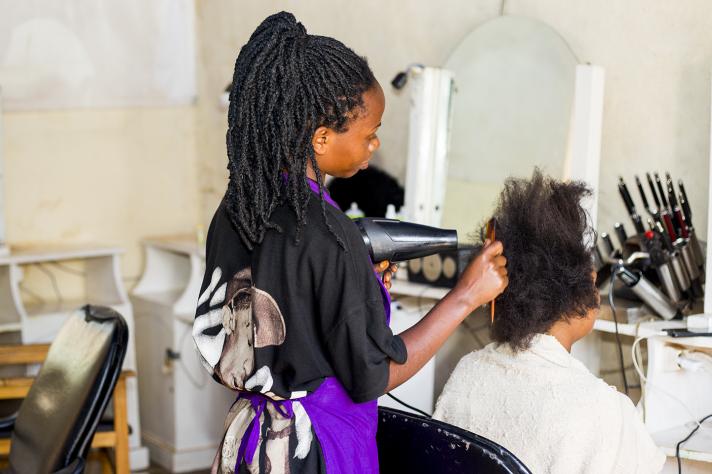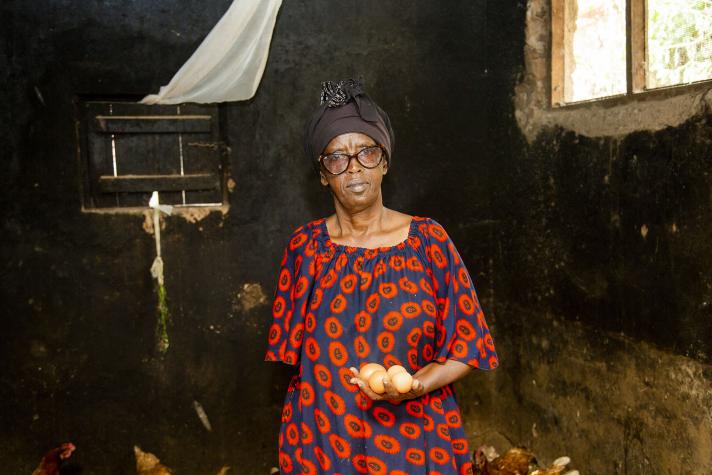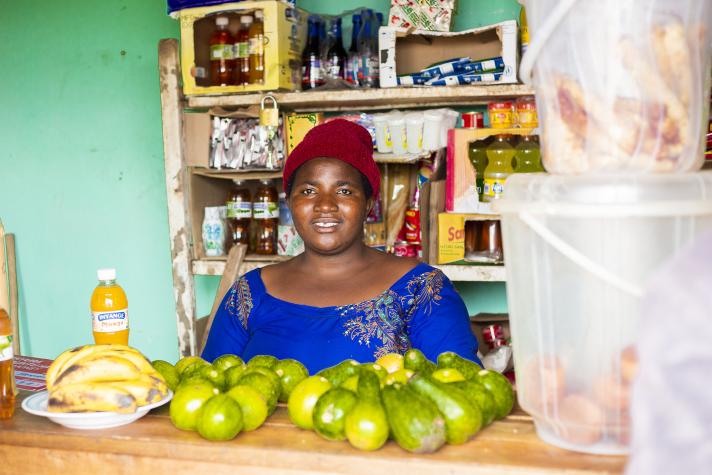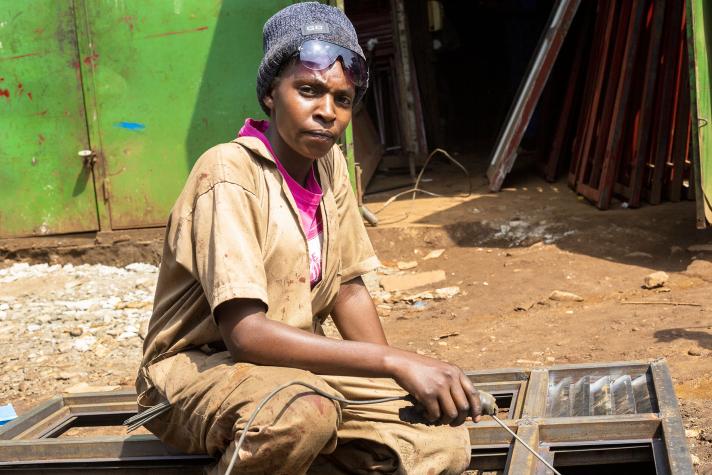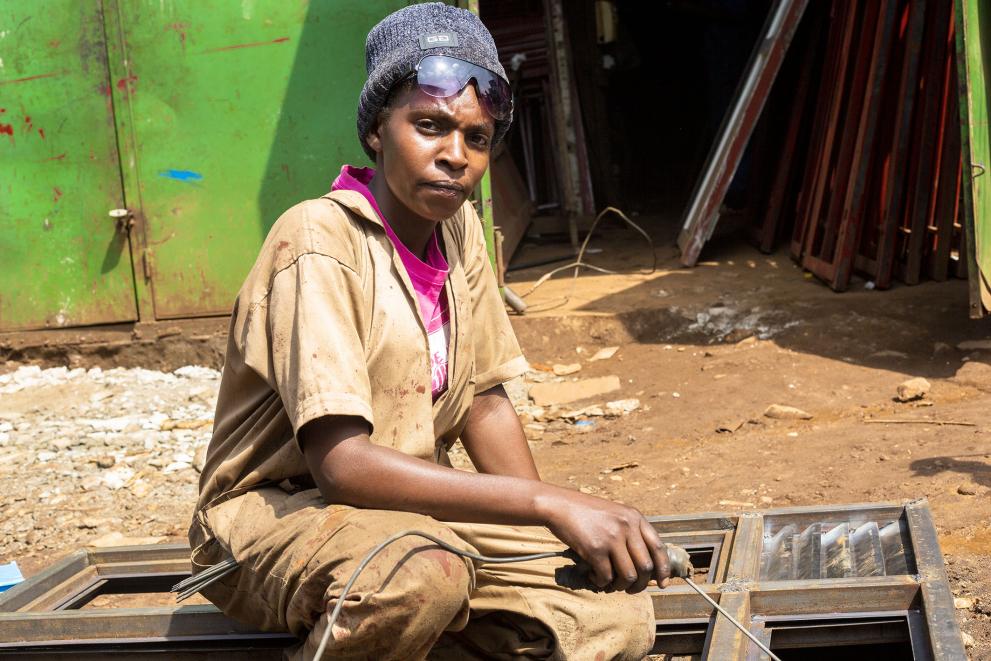
The Dukorane Umurava project, co-financed by the European Union (EU) and the German Federal Ministry for Economic Cooperation and Development (BMZ), has enabled refugees and members of the host communities in Rwanda to acquire skills, find jobs, boost their businesses, and support their families.
The project focuses on Technical and Vocational Education and Training (TVET), business start-up and expansion, psychosocial support and enhancing framework conditions for economic inclusion of refugees and vulnerable youth from Rwanda.
Muhoza Joyeuse's Journey to Becoming a Hairdresser
Muhoza Joyeuse, was born and grew up in the former Gihembe refugee camp and despite limited resources, she pursued her education.
However, due to financial constraints, she had to drop out of school her first term of Senior 5.
This left her unemployed and worried about her future. She disliked having to rely on her parents for everything she needed, despite being old enough to contribute to the family’s income.
Fortunately, the Dukorane Umurava project, provided her with the opportunity to enroll in a Technical and Vocational Education and Training (TVET) programme in June 2022, alongside her peers from Gihembe refugee camp and members of the host community from Gicumbi district.
After completing a seven-month course in hairdressing (which included four months of training of boarding school, and a three-month industrial attachment programme for practical experience), Muhoza secured a job as a hairdresser in a center called Kabeza outside the camp and is now supporting her family.
Ngarukiye's Path to Entrepreneurship
Ngarukiye Dieu Merci, a Congolese refugee, saw an opportunity to gain valuable skills and get casual jobs in hairdressing through Dukorane Umurava’s TVET programme, much like Muhoza.
He is a Congolese refugee who relocated to Mahama camp, after the closure of the former Gihembe camp in Gicumbi district where he was born.
Jobless, he decided to join the programme and learn the skills he needed to succeed. He now lives with his mother and four siblings, and with his newfound skills, he opened a small hair salon with colleagues in February 2023.
He also works in other salons when needed and supports his family with the money he earns.
Overcoming Fear and Building Success: Mukayisinga's and Mukapasika’s Entrepreneurial Journeys
Mukayisinga, an entrepreneur and mother living in Kageyo Sector of Gicumbi district, participated in entrepreneurship trainings organised by the Dukorane Umurava project and joined the Business Counselling and Exchange (BCE) group.
The BCE groups benefit of the support of Business Development Advisors, that advise start-ups and MSMEs to strengthen their business plans, identify finance opportunities and further grow their business.
After participating in this training, and thanks to the support and encouragement of Business Development Advisors, Mukayising took out a loan from a micro-finance institution and resumed her chicken-rearing business which had been affected by the Covid-19 pandemic.
Prior to taking part in the Dukorane Umurava project, Mukabasinga says that she was afraid of taking out a loan, as she was worried that her house would be auctioned in case she became unable to repay it. However, she says that she is now repaying the loan on time as required, and her plan is to apply for another one to further boost her business. “My egg chicken rearing project enables me to provide for my family of five people, including some children who are still at school,” says Mukayisinga.
Another entrepreneur who benefited from the Dukorane Umurava project and the Business Counselling and Exchange (BCE) group, is Mukapasika, who used to run a small shop in Gicumbi district.
Despite their desire to expand their business, Mukapasika and her husband lacked the necessary knowledge and resources to do so. However, their dreams became a reality after participating in various trainings offered by the Dukorane Umurava project, including competency-based economies through formation of enterprises (CEFE) and the Business Counselling and Exchange approach. With the support of these programs, Mukapasika and her husband were able to secure a loan from the bank and open a second shop.
The increase in income has brought them newfound happiness and a sense of hope for a brighter future. As Mukapasika puts it, "“I am now happy that our business was boosted to generate more income, and I have hope for a better future as our income has increased,” says Mukapasika.
Breaking Stereotypes: Nyirarukundo's Journey as a Female Welder
Meet Nyirarukundo, a young woman who defied gender stereotypes to pursue her passion for welding. Despite initial discouragement from her peers, she joined the TVET programme in June 2022 and quickly proved her skills as professional welder.
Before joining the programme, Nyirarukundo faced many difficulties and struggled to afford basic necessities like lotion and food. But now, she proudly supports herself.
According to Nyirarukundo, the most significant change in her life is that she is now working as a welder and is no longer jobless. “I get whatever I need without depending on anyone else’s support like before, and I am now in a savings group,” says Nyirarukundo.
Nyirarukundo's long-term goal is to open her own welding workshop and provide job opportunities to others. “I call upon my fellow girls to become fearless and join the welding trade, because it is not meant for boys and men only as some people think, but rather we (girls) are also able!” Nyirarukundo added with confidence.
Nyirarukundo's story, along with others, demonstrates the remarkable impact of TVET programs in empowering individuals through determination and skill-building.
More about the Project:
The Dukorane Umurava project is an initiative in Rwanda, implemented by the Deutsche Gesellschaft für Internationale Zusammenarbeit (GIZ) GmbH and financed by the European Union (EU) and the German Federal Ministry for Economic Cooperation and Development (BMZ). The overall objective is to increase the well-being of displaced populations and their host communities and reduce inequalities between these groups. The specific objective is to reduce the negative socio-economic impact of new and recurrent displacement situations. Dukorane Umurava runs from February 2021 till October 2023 and is commissioned under the Economic Inclusion of Refugees and Host Communities (ECOREF) programme with 1.6 Mio EUR financial contribution from the EU.
Dukorane Umurava focuses on refugees originating from the former Gihembe refugee camp in Rwanda’s Northern Province and its host district Gicumbi. An integrated approach to employment promotion is applied, combining four interlinked field of activities, consisting of professional upgrading, entrepreneurship promotion, psychosocial support and measures to enhance overall framework conditions to become (self-)employed. So far, the project has supported 589 youth, of which 288 Congolese refugees and 301 from Gicumbi to undergo short-term technical training and follow-up support in entrepreneurship and financial literacy.
The project also trained 50 existing entrepreneurs, of which 30 refugees and 20 from Gicumbi resulting in business plans to grow their business. The entrepreneurs are currently being coached by Business Development Advisors through a Business Counselling and Exchange (BCE) approach to facilitate exchange between entrepreneurs and make business plans bankable and facilitate access to finance.
Details
- Publication date
- 16 May 2023
- Author
- Directorate-General for International Partnerships
- Region and Country
- Horn of Africa
- Rwanda
- Thematic
- Greater economic and employment opportunities
- Strengthening resilience of communities
- Partner
- GIZ

